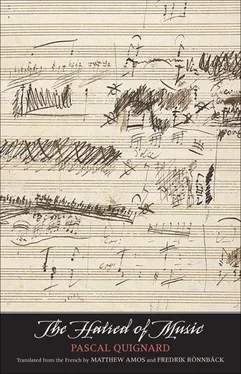Pascal Quignard - The Hatred of Music
Здесь есть возможность читать онлайн «Pascal Quignard - The Hatred of Music» весь текст электронной книги совершенно бесплатно (целиком полную версию без сокращений). В некоторых случаях можно слушать аудио, скачать через торрент в формате fb2 и присутствует краткое содержание. Год выпуска: 2016, Издательство: Yale University Press, Жанр: Современная проза, на английском языке. Описание произведения, (предисловие) а так же отзывы посетителей доступны на портале библиотеки ЛибКат.
- Название:The Hatred of Music
- Автор:
- Издательство:Yale University Press
- Жанр:
- Год:2016
- ISBN:нет данных
- Рейтинг книги:3 / 5. Голосов: 1
-
Избранное:Добавить в избранное
- Отзывы:
-
Ваша оценка:
The Hatred of Music: краткое содержание, описание и аннотация
Предлагаем к чтению аннотацию, описание, краткое содержание или предисловие (зависит от того, что написал сам автор книги «The Hatred of Music»). Если вы не нашли необходимую информацию о книге — напишите в комментариях, мы постараемся отыскать её.
is Quignard’s masterful exploration of the power of music and what history reveals about the dangers it poses.
From prehistoric chants to challenging contemporary compositions, Quignard reflects on music of all kinds and eras. He draws on vast cultural knowledge — the Bible, Greek mythology, early modern history, modern philosophy, the Holocaust, and more — to develop ten accessible treatises on music. In each of these small masterpieces the author exposes music’s potential to manipulate, to mesmerize, to domesticate. Especially disturbing is his scrutiny of the role music played in the concentration camps of Nazi Germany. Quignard’s provocative book takes on particular relevance today, as we find ourselves surrounded by music as never before in history.












